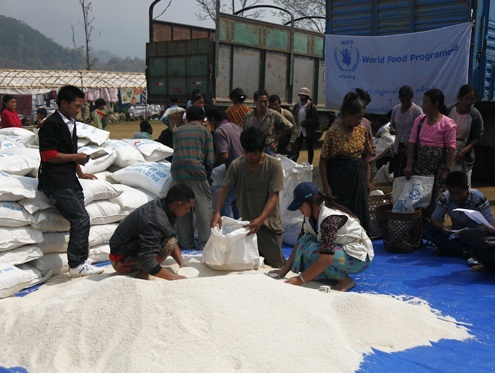Today the world is witnessing human suffering on a scale that has not been seen since the end of the Second World War. More than 130 million people around the world need humanitarian assistance. Together they would form the tenth most populous country in the world. In Burma alone, hundreds of thousands of people are estimated to be in humanitarian need due to disasters and protracted conflict. On World Humanitarian Day, their plight is front and center in our hearts and minds.
Burma is extremely vulnerable to natural disasters, ranking ninth out of 191 countries on the global Index of Risk Management. Every year, hundreds of thousands of people are displaced by flooding during the annual monsoon rains, underscoring the importance of investment in preparedness. This year has been no exception. Since the end of July, close to half a million people have been temporarily displaced across eleven states and divisions by monsoon flooding. This is in addition to the 220,000 displaced people already living in camps and host communities in Kachin, northern Shan and Arakan states as a result of protracted conflict. Decades of displacement and underdevelopment have left people with little access to essential services such as healthcare and education.
It is against this sobering backdrop that we commemorate this year’s World Humanitarian Day on the 19th of August. On this day we unite as “one humanity” with others across the world who are affected by conflict and disaster, while recognising the hard work and dedication of humanitarians working in this country, across this region and around the world to alleviate suffering. On World Humanitarian Day, we also remember and pay tribute to those heroic colleagues who have lost their lives in humanitarian service. This includes eight aid workers and volunteers who died while helping people in need during the August 2015 floods in Burma. Our hearts go out to their loved ones.
World Humanitarian Day 2016 follows one of the most pivotal moments in the history of humanitarian action: the World Humanitarian Summit in Istanbul. I was part of an 18-strong delegation from Burma that attended the Summit where the global humanitarian community came together to declare their support for a new Agenda for Humanity, as well as to make a collective commitment to reduce suffering and deliver better for people caught in crisis.
At the Summit, the Burmese government reinforced its commitment to providing humanitarian access to vulnerable people and to investing in disaster preparedness. Local NGOs from Burma also took the opportunity to advocate for better recognition of their central role in responding to crises and urged the humanitarian community to work with them more closely. In Burma, their call for greater recognition and support is a strong one.
In Kachin and Shan States, local organisations are already central to providing vital humanitarian relief to those in need. When a natural disaster strikes or conflict breaks out in Burma, it is always local people, local civil society organisations (CSOs), local authorities and NGOs who are the first to respond. They do so effectively because they have deep roots in their communities and national staff who have an unmatched capacity to understand and navigate the local context. They are able to respond more quickly and efficiently due to their extensive in-country networks and lower overheads. Complementing and enhancing their invaluable roles and services should be a centrepiece of the international humanitarian response. To continue this vital work, local organisations need a stronger voice at the international humanitarian table, they need to receive funding more directly, and they need international organisations to invest more in working closely with them and further enhancing their capacity.
[related]
There is now an urgent need to make good on the global promises and messages from the World Humanitarian Summit, turning commitments into concrete action. I am pleased to say that here in Burma, the humanitarian community is already taking strides in the right direction when it comes to supporting local and national CSOs.
Being “as local as possible and as international as necessary” was one of the rallying cries at the Summit and the recent flood and measles responses in Burma are practical examples of this principle in action. Local, state and regional governments have effectively led the flood response in collaboration with national partners, CSOs and the private sector. International organisations have been working in support of the government where requested, particularly on food, but national actors have been firmly in the driver’s seat. Likewise in the remote and under-developed Naga Self-Administered Zone, where a deadly measles outbreak has been confirmed, the Ministry of Health has mobilized response teams to investigate and respond, with technical support provided by the World Health Organisation and UNICEF.
It is little wonder that local humanitarian organisations and CSOs are such a central part of Burma’s social fabric given the country’s unparalleled culture of compassion and generosity in the face of suffering. According to the 2015 World Giving Index, people in Burma are the most generous on earth, more willing to volunteer their time or donate their money than anyone else on the planet. On this World Humanitarian Day, I urge all of us to pause and reflect on how we can spread this Burmese spirit of compassion to ensure that no-one’s suffering is ignored.
Renata Dessallien is the UN Resident and Humanitarian Coordinator in Burma



